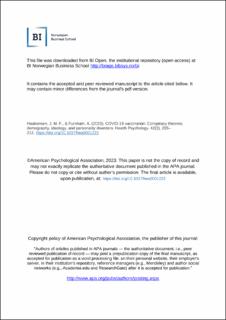COVID-19 Vaccination: Conspiracy Theories, Demography, Ideology, and Personality Disorders
Journal article, Peer reviewed
Accepted version
Permanent lenke
https://hdl.handle.net/11250/3115094Utgivelsesdato
2023Metadata
Vis full innførselSamlinger
Originalversjon
10.1037/hea0001222Sammendrag
Objectives: To understand the role of personal experience, religious and political beliefs as well as conspiracy theory beliefs on the acceptance of COVID-19 vaccination. Method: Just under 400 adults completed online questionnaires assessing to what extent they endorsed conspiracy theories (CTs) and an evidenced measure of personality disorders (PDs). One month later, they were asked about having the COVID-19 vaccine. We examined the relationship between demographic (age, sex, education), ideology (political and religious beliefs), general beliefs in CTs, PDs and attitudes toward vaccination. Results: We found, as anticipated, conservative political orientation, religiosity, Cluster A PDs, and conspiracy thinking correlated negatively with vaccine acceptance. Analysis of variance (ANOVA) showed that the group of vaccine accepting individuals differed from the group of individuals either hesitant or resistant to the vaccine with respect to education, personal ideology, general conspiracy theory adherence, and cluster A PDs. Multinomial logistic regression indicates that religiosity, conspiracy thinking, and lower levels of education predict vaccine hesitancy or rejection. Conclusion: Implications for “rolling out” the vaccine are discussed in terms of who to target and how to address misbeliefs about vaccination.
